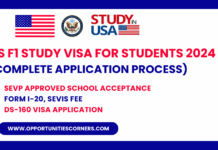If you want to come to Germany as a student then you have to apply for the Germany Student Visa. Studying in Germany is very affordable compared to other countries. There are many tuition fee universities, as well as students with 2.1 and 2.2 CGPA, also get admission to German Public Universities. I have covered in my previous post-study in Germany With LOW CGPA. A German degree opens many doors. There are many opportunities in Germany for everyone.
Germany is attracting students from all corners of the world because of low tuition fees, alot of German universities offer scholarships, and part-time work opportunities. Obtaining a visa to study in Germany is a great option. A residence permit is also required. The embassy of Germany will process your visa application. The Germany student visa is a long-term visa. More information, the required documents, and the application process are given below.
Join our WhatsApp Groups to stay connected with us.
Requirements of a Germany Student Visa
- For a bachelor’s in Germany, you should have completed 12 years of education.
- For a Masters in Germany, you should have completed 16 years of education.
- You have been accepted and have received an offer letter from the German university.
- Provide proof of your educational documents such as secondary education, transcripts, and higher education degrees.
- Proof of payment that you can cover your costs of living for the duration of your studies (with at least €11,208 per year as of 2023). This can be exempted if you are on a scholarship.
- This can be done by way of opening a block account in Germany. If you dont know how to do it, I have made a detailed post on How to Open a Block Account in Germany
- You might be required to show a proof of Language test to the German Embassy or Consulate.
- If you are required to provide proof of your German language skills, you will generally have to be at a minimum level of B2.
- Proof you have paid the visa application fee.
- Travel Health Insurance
Who Does Not Need a Visa?
Citizens of EU and EFTA States (Iceland, Liechtenstein, Norway, or Switzerland) do not require a visa or a residence permit
Citizens of Australia, Israel, Japan, Canada, the Republic of Korea, New Zealand, the United Kingdom of Great Britain and Northern Ireland, and the United States of America can enter Germany without a visa.
All other third-country nationals must submit a visa application to their local German embassy or consulate before entering Germany.
Types of German Visa for Study Purposes
If the purpose of your visit to Germany is educational and long-term, you will have to apply for the Germany National Visa (D Visa), which is long-term.
There are three types of German Student visas:
- Language Course Visa. German Language Courses lasting from 3 months to 1 year.
- Student Applicant Visa. If you still haven’t gotten a formal admission letter from the university you applied to you need to enter entrance examinations offered by the university. It is valid for 3 months with the possibility of extending to 6 months.
- Student Visa. This is a long-term visa if you have been accepted to a German university for a bachelors, master’s, or in a PhD degree program.
How to Apply for the Germany Student Visa?
- The application process is pretty simple.
- After completing all of the above steps and you have all the documents in hand.
- You need to Go to the German Embassy or Consulate in your country to submit your application.
- To find out which German embassy or consulate you will have to contact regarding your visa application, see World Map set up an appointment, check the list of updated documents for study visa as well as the processing time.
- It is advised to apply at least 3 months before.
Please go through World Map and choose your country, because the application process might be different for each country.
Visa Cost
The German student visa fee is €75. Check this link if you are exempt from paying the visa fee.
Apply for the Residence Permit after Arriving in Germany
You need to apply for a residence permit with the residents’ registration office closest to your home in Germany. People in Germany and students can help you in this step.
With the resident permit, you can:
- Work during your study program.
- Stay in Germany after you finish your program
Staying in Germany after obtaining your degree
You have several options to stay in Germany after completing your education. You can apply for the Job Seeker Visa, or if you have received a Job offer you can apply for the German Employment Visa.
Short-Term Summer Student Programs in Germany
- HZB International Summer Student Program 2024, Germany (Fully Funded)
- HZDR Summer Student Program 2024, Germany (Funded)
- DESY Summer Student Program 2024, Germany (Fully Funded)
- Cross Culture Program (CCP) Fellowship 2024, Germany (Fully Funded)
- Max Planck Internship 2024 in Germany (Fully Funded)







